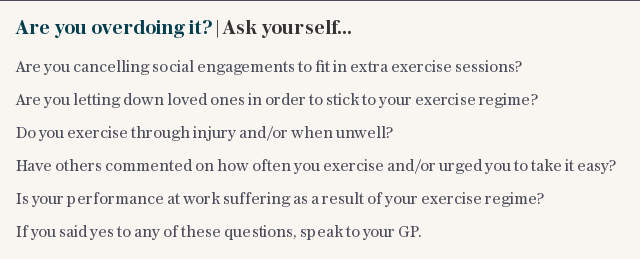How to get just the right amount of exercise for your body (and mind)

How do you stop yourself from doing too much exercise? It’s admittedly not a question that keeps too many of us up at night. Health experts are often mocked for changing their advice dramatically from one day to the next, but on exercise the chorus has been constant: the more of it you do, the healthier and happier you will be.
Until now.
A major study published this week suggests that exercising for more than 90 minutes a day could actually make your mental health worse. Researches at Oxford and Yale examined the fitness regimes of 1.2 million participants, and asked them to plot their mental health each day.
Those who exercised regularly were found to have better mental health than those who never exercised, reporting only two days of “feeling low” each month, compared to 3.4 for the inactive. Those who exercised for periods of 90 minutes or more at a time, however, actually reported worse mental health than those who did no exercise at all.

How do you find this Goldilocks period? The sweet spot where you’re doing just enough exercise to keep your body in shape, but not so much that it gets you feeling low?
Know thyself
The simplest way to keeping your exercise to a healthy limit is to know your own body, says fitness expert Born Barikor.
Born believes that exercise is just as important for your mental wellbeing as for your physical fitness, and has founded a company, Our Parks, that encourages inactive people to jog around their local parks.
It’s easy, he says, to get swept up in exercise fever and to lose sight of what works for your own routine. Your body will usually tell you if you’ve worked too hard, so it’s important to take a break when you feel fatigued.

“Whether you’ve done a run or lifted weights, if you’ve put your body through stress you need time to recover. You might need a whole day or so to recover. Some people confuse tiredness with not being strong enough, or not being motivated, when it’s not the same thing. All the best athletes use tiredness to give them a sign of when they are going too hard and when they need to have a rest.”
He says it’s also important to keep within the limits of your maximum heart rate, which will generally depend on your age, weight, and fitness, and can be found through a quick internet search.
Enjoyment is also a huge factor, he says. Born’s company emphasises the social element of exercise, encouraging members to work out together in large, friendly gatherings. If you find yourself dreading exercise every day, he says, that’s a good sign it could be hurting your mental wellbeing.

“I don’t enjoy swimming, so I don’t swim,” he says. “But I enjoy running and so I run a lot. It’s about finding something that you consistently enjoy doing.”
See it for what it is – an addiction
When we hear the word ‘addiction’ we usually conjure up a list of life-ruining drug, alcohol, and gambling dependencies. In that context, it’s tempting to think of exercise as one addiction you wouldn’t mind having.
But exercise addiction is real, says nutritionist and fitness expert Rick Hay.
He’s not surprised by the findings of the Yale and Oxford study, and says many of his own clients exercise too much. “It can be quite addictive, but I’m always pointing out [to my clients] that you need some recovery time in order to get the optimal psychological and physiological benefits.
“For many people, over-exercising has become the norm – they end up with a type of psychological addiction which unfortunately negative impacts on their overall mental and physical health.

“My whole health and fitness philosophy is about balance. Sadly in today’s society it seems to be all or nothing for many of us.”
Tracking
The simplest way to keep your exercise addiction in check is just to measure how much of it you do each week. It sounds painfully obvious, but many of us don’t bother, says Born Barikor, and thanks to today’s world of fitness apps, it’s never been easier.
He recommends Strava, which allows runners and cyclists to track their fitness routine and share tips with millions of their peers. He also points to MadeToMove and Apple Health – which most of us already have on our smartphones – as two of his personal favourites.

Let’s not forget: exercise is a good thing
Could the findings of the Oxford and Yale study now transform 'over-exercise' into public health threat number one? The scourge of our age which must be stamped out at any cost?
Not quite. For the vast majority of us, Born and Rick agree, the compelling issue is how to do more exercise, not less of it.
“My main concern when I read the study today was that we don't want it to go out and then everyone who's not exercising to think 'this is why I'm not doing anything, because it's actually bad for you anyway’,” says Born.
“We have to be very clear that doing excessive amounts of anything will be bad for you. But doing moderate amounts of exercise will improve your quality of life, concentration, and help you live longer.”

